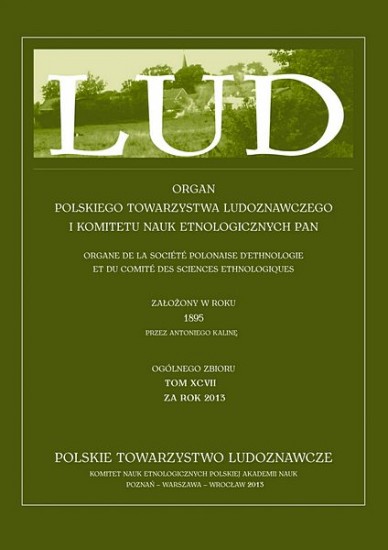DROGI WIEDZY W ANTROPOLOGII SPOŁECZNO-KULTUROWEJ PO ZWROCIE KU SENSORYCZNOŚCI I NIEDYSKURSYWNEMU DOŚWIADCZANIU RZECZYWISTOŚCI
THE PATHS OF KNOWLEDGE IN SOCIO-CULTURAL ANTHROPOLOGY AFTER THE SENSUAL AND NON-DISCURSIVE TURN IN EXPERIENCING REALITY
Author(s): Katarzyna MajbrodaSubject(s): Anthropology, Recent History (1900 till today), Cultural Anthropology / Ethnology
Published by: Polskie Towarzystwo Ludoznawcze
Keywords: anthropology of senses; emotions; experience of reality; knowledge; rationality; sensority; linguistic turn; literary turn;
Summary/Abstract: The cognitive legitimisation as well as the ways of interpreting the reality are constantly changing in anthropology. The article aims to outline the new ways of cognition in socio-cultural anthropology emphasising the shift towards experiencing socio-cultural reality. It focuses on several leads which imply the revival of the experience, the sensual and the emotional aspects in the cognitive process and which are perceived as a remedy for both the positivistic rationalism and the socio-cultural constructivism. The basic assumption of anthropology focused on the experience and the sensual is that anthropologists should approach the social concrete as closely as possible in order to be capable to describe the reality in the most „common”, „natural” and „experienced” ways. The emerging of sensual anthropology in the 1990s is usually related with the postmodern and postcolonial critique within the discipline. It shows therefore that the presupposition of this relatively new research perspective has both, the epistemological and the political character. The article, however, attempts to present the view that the principles of sensual anthropology may be observed also in the modernist anthropology, particularly in the writings of Bronisław Malinowski and Margaret Mead. In addition, the analysis of the new ways of cognition in anthropology shows the cognitive situation in historiography and allows us to introduce some analogies in the cognitive transformations of both disciplines as well as the impact of consecutive turns that reoriented them and shifted towards the language, text and the common knowledge, which is situated outside the scientific legitimisation and in the close relations to everyday cognition mediated by the body and senses.
Journal: LUD
- Issue Year: 97/2013
- Issue No: 1
- Page Range: 17-38
- Page Count: 22
- Language: Polish

